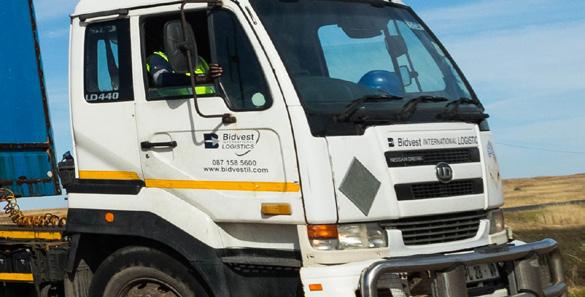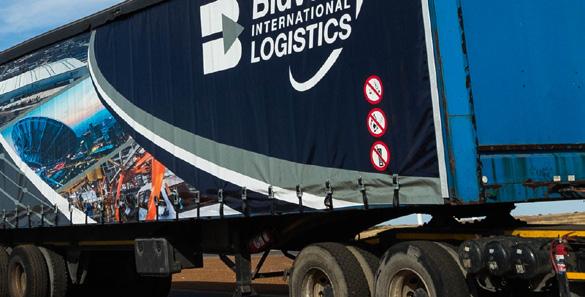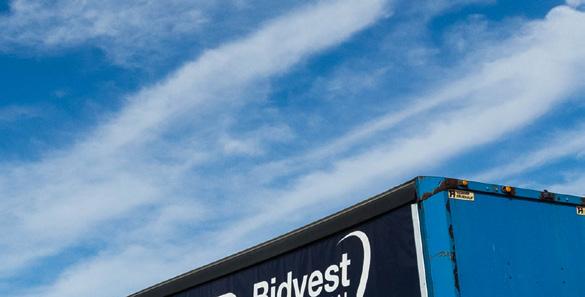
2 minute read
THE LOGISTICS INDUSTRY NEEDS TO ADAPT TO NEW TRENDS IN SUPPLY CHAINS


Advertisement



Flexibility and agility are the key to servicing clients, according to Bidvest International Logistics experts Rhett Oertel and Marcus Ellappan.

TThe logistics industry battled a number of challenges in 2022, among which were the war in Ukraine and turmoil over China’s strict Covid-19 policies.
Despite this turmoil, the world emerged from the worst of the pandemic, meaning that supply chains returned to some degree of normality despite the conflict in Eastern Europe.
Within this context, a number of significant developments occurred within the industry itself, and the impact of these is anticipated to be felt this year and beyond.
From a shipping perspective, acquisitions by shipping lines last year changed the landscape to some extent. These companies were highly profitable between 2019 and 2022 and many used some of these profits to enter various landside logistics businesses – from warehousing to transport and IT-related services.
Going forward, this shake-up is expected to create new alliances within the industry, with old alliances becoming new competitors.
Another major development last year was the increased adoption of technology and automation to drive efficiencies and reduce costs.
According to Bidvest International Logistics (BIL) Head of Sales Rhett Oertel, in 2023 technology adoption will keep driving supply-chain companies in the direction of automation while increasing visibility, improving predictive analytics and optimising supply chains.
“The impact of blockchain, artificial intelligence (AI) and electric vehicles in the supply-chain industry will be ongoing. Blockchain is in use in trade financing and contract execution and is even tracking AI use in the supply chain to help with forecasting,” says Oertel.
It is a view shared by Oertel’s colleague and BIL Director Marcus Ellappan, who says that with the logistics industry under constant pressure to reduce costs, businesses increasingly will be looking at automating processes.


Another trend that emerged in 2022 and should become even more prevalent is Environmental, Social and Governance (ESG) compliance.
“ESG will remain for years to come as companies focus on reducing their carbon footprint and reducing their overall impact on the environment. The emphasis on ESG is at the forefront of a lot of discussions nowadays as companies look to partner with people who, like them, invest in green technologies and initiatives,” Oertel says.
This will entail companies needing to be more involved in the entire lifecycle of products and packaging.
For South African businesses, loadshedding and high fuel prices remain a huge problem. As a result, Ellappan expects to see them focusing a lot more on efficient management of fuel usage and renewable energies. As he puts it, “Burning fuel in generators is not the way to go.” The industry is of course keeping a watchful eye on tensions between certain countries. In the event of these escalating, new policies that will have an impact on trade could be introduced. Trade agreements or changes in tariffs, for example, will affect the flow of goods and the cost of doing business.


Oertel concludes, “I do believe as a company one needs to be aware of these developments and strategically apply the required focus on the aspects that will impact your market in the most effective way.
“All in all, supply-chain business models seem to be changing and the need for flexibility and agility is becoming key to servicing clients. E-commerce is continually growing. This in the end leads to the demand for faster and more flexible and reliable supply chains.”
Ellappan confirms this assessment: “Coming out of Covid, together with various global supply-chain issues, businesses are forced to become more efficient. The benefits of digital transformation, risk management and ESG will most certainly talk back to a business’s bottom-line results and sustainability.”
ABOUT BIDVEST INTERNATIONAL LOGISTICS (BIL)

BIL is one of South Africa’s largest logistics businesses, owned by services, trading and distribution powerhouse Bidvest. BIL provides an end-to-end supply-chain solution across a number of different industries. It offers international import and export services, using road, sea and air. BIL is able to clear, warehouse, fulfil and distribute through final-mile distributing services. The company has massive coverage and access to a worldwide forwarding network. Its leading technological capability gives customers full visibility of their orders 24/7, whether they’re single items or bulk, express or deferred.














